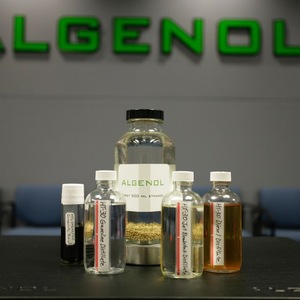Algenol launches algae fuels demonstration project in India

Algenol
January 21, 2015
BY Algenol
Algenol and Reliance Industries Ltd. have successfully deployed India’s first Algenol algae production platform. The demonstration module is located near the Reliance Jamnagar Refinery, the world’s largest.
“The project is designed to demonstrate how robust the Algenol system is in India, and how the two companies will more broadly integrate refinery operations with Algenol’s platform in the future,” says Paul Woods, founder and CEO of Algenol. “The deployment of our technology in India is a critical milestone,” adds Woods.
Advertisement
Advertisement
The demonstration has completed several production cycles of Algenol’s wildtype host algae, but ultimately could demonstrate the fuels production capabilities of Algenol’s advanced fuel producing algae and systems. The Algenol fuel production process is designed to convert 1 metric tons of CO2 into 144 gallons of fuel while recycling CO2 from industrial processes and converting 85 percent of the CO2 used into ethanol, gasoline, diesel and jet fuels. The advanced fuel producing algae technology is successfully operating at Algenol’s Fort Myers, Florida, headquarters.
“The initial project start-up and smooth transition begins to prove the viability of our technology in varying environments across the globe and the ability of partners to operate our production systems without Algenol’s day-to-day involvement,” explains Woods.
Construction of the system was completed in November by Algenol and Reliance engineers and biologists. Shake-down runs and systems tests have been completed and several successful batches of algae have been grown. At this time, day-to-day operations of the project are managed solely by Reliance Industries, after Algenol provided training and operational support. The effort is proof that Algenol’s technology can be colocated with and successfully managed by a partner.
Advertisement
Advertisement
The relationship between Reliance Industries and Algenol is not new, as Reliance has been a strategic investor in Algenol’s technology since June 2011. Algenol’s technology recycles carbon dioxide into fuels through its direct-to-ethanol process which results in not only ethanol but gasoline diesel and jet fuel. India is the world’s third largest producer of CO2 and the facility’s ethanol and renewable crude oil production could help meet critical demand for energy in the country as well as help to reduce green house emissions from carbon dioxide. Algenol’s fuel production process requires saltwater rather than freshwater – a key advantage for India - which has incurred serious droughts in the past and faces significant demand for fresh water. The project is currently using saltwater from the Arabian Sea.
Related Stories
CoBank’s latest quarterly research report, released July 10, highlights current uncertainty around the implementation of three biofuel policies, RFS RVOs, small refinery exemptions (SREs) and the 45Z clean fuels production tax credit.
The USDA significantly increased its estimate for 2025-’26 soybean oil use in biofuel production in its latest World Agricultural Supply and Demand Estimates report, released July 11. The outlook for soybean production was revised down.
The U.S. Energy Information Administration maintained its forecast for 2025 and 2026 biodiesel, renewable diesel and sustainable aviation fuel (SAF) production in its latest Short-Term Energy Outlook, released July 8.
XCF Global Inc. on July 10 shared its strategic plan to invest close to $1 billion in developing a network of SAF production facilities, expanding its U.S. footprint, and advancing its international growth strategy.
U.S. fuel ethanol capacity fell slightly in April, while biodiesel and renewable diesel capacity held steady, according to data released by the U.S. EIA on June 30. Feedstock consumption was down when compared to the previous month.
Upcoming Events










